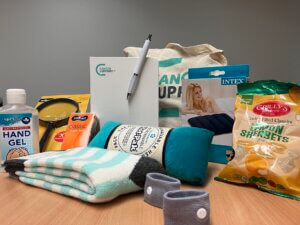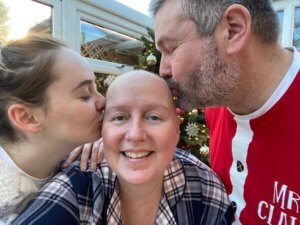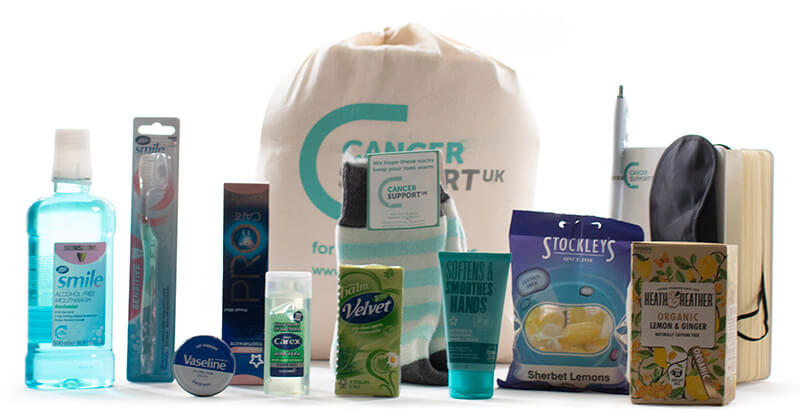
There are lots of ways you can give a loved one practical and emotional support, but remember to keep your relationship as normal and balanced as possible
What’s the best way to support a loved one with cancer?
The most important way to support a family member who is diagnosed with cancer is to let them know that they can talk about cancer.
There’s plenty of practical support as well as emotional support that can be given. But first of all, ask them how they would like to be supported. Cancer is so individual and affects everyone differently, so it is important that the family recognises this and responds appropriately. This applies equally if you are supporting a friend who has cancer.

Free to order, the Comfort Kit contains many practical items to help alleviate the discomfort of cancer treatment
Practical support – order a free Cancer Kit
In terms of practical support, you could order a free Cancer Kit from Cancer Support UK. There are four different types of kit, depending on the type of treatment being given.
Each bag contains items to practically support someone going through cancer, from sensitive toothpaste to cosy socks.

Cancer Coach is available online and offers a safe space to talk about your cancer experience
Emotional support – join Cancer Coach
Our Cancer Coach peer support groups offer a safe, non-judgmental space where your loved one can talk about their true feelings and fears around cancer with other people who have gone through cancer.
Other types of support
- Hugs can make a big difference or a squeeze of the hand.
- Even just sending a card or a text or making a phone call to say you are thinking of them. It’s important to keep this contact up. These small messages can make a huge difference to someone who may be feeling lonely and isolated, especially after treatment has ended.
- Don’t be afraid to reach out for support yourself. Call a support line to share how you are feeling, without burdening the person who is going through cancer. There are plenty of free online resources, communities and support lines.
- If you can, attend cancer appointments with your family member. It can be extremely helpful for them if you take notes and act as another “pair of ears”, so you can discuss what was said in the appointment afterwards.

A hug can mean so much to a person facing cancer
What can family members do to rally around their loved ones?
Allow the person to make the decision on what to accept.
- Lifts to appointments
- Getting a new book or magazine for them to read during chemo
- A home cooked meal
- Shopping – as someone going through cancer treatment can get tired very easily.
- Let them know that you are there if they want to talk to you.
- Share a joke or laugh with them – keep your relationship as normal and balanced as possible.
What things should you avoid saying?
People are often afraid of saying the wrong thing to someone with cancer. However, it’s important to say if you are feeling awkward and to acknowledge the situation, rather than pretending it’s not happening.
- Never assume how people are feeling. Focus on the listening rather than worrying about what to say. Better to check in ask what they need.
- Don’t bring up someone else’s cancer story. Cancer is so unique, that listening to how someone else went through cancer isn’t helpful or reassuring.
- Don’t say things like “are you feeling better?”.
- Avoid saying you know how someone feels.
- Don’t tell someone to be strong and positive as it puts pressure on them to behave in a certain way.
- Don’t tell someone that they are brave – they didn’t choose to have cancer and they may be feeling very frightened. Telling them they are brave, puts additional pressure on them to behave in a certain way.
Above all, emotional support can make a big difference to their quality of life.
What things should you say?
Cancer is an overwhelming experience and while it’s important to keep checking in on your loved one, don’t overload them with questions or dictate what they should/shouldn’t do or what they should be feeling. Always ask them what support they want, as their needs will change throughout their journey.
- You can start the conversation very simply by asking ‘how are you feeling today?’
- It is really important to have open conversations. Avoid asking closed questions, such as “Are you okay?”, which elicit one word or short answers and require follow up questions.
- Instead start conversations by inviting them to give you more information.
- Let them set the agenda for the discussion. They may want to talk to you about a practical concern or an emotional one. So avoid putting your own thoughts and emotions on to them.
- Remember, it’s about how they are feeling, rather than how you expect them to be feeling.
- Finally, don’t take it personally if someone doesn’t want to talk about their cancer and respect their privacy.
How cancer can make you feel
What impact can the cancer diagnosis have on the family?
Cancer can cause stress, fear and put immense strain on a family. Information overload, understanding medical terms, as well as financial pressure.
If the person going through cancer treatment is unable to work, this will impact on income, especially with increases in cost of living.
The emotional impact can drain you when supporting someone with cancer – you will be on the receiving end of the emotions being experienced by the person with cancer, such as anger, grief, sadness, loneliness, fear and worry.
It’s important not to neglect your own needs, during this time, or you may end up not being able to cope. Allow yourself time to process what’s happening/has happened and take breaks as and when you can.
What support is available?
Cancer Support UK offers practical and emotional support to people living with and beyond cancer through its free Cancer Kits and free Cancer Coach programme.
There are also plenty of free support helplines for both the person diagnosed and family/friends:
Macmillan offers emotional and practical support for both patients and their families.
Cancer Research has a nurse helpline
There are also online helplines (if you don’t want to talk to someone on the phone), where you can interact with peers and professionals for advice.
Cancer Support UK has compiled a list of useful charities and organisations that family members and people with cancer can access for help.
What activities can help someone cope with cancer?
In our free six-week Cancer Coach programme, we cover relaxation and breathing techniques, to help improve mental wellbeing.
Other activities such as walking, swimming, reading or listening to music, can help someone focus on the moment and escape from the cancer situation. This can be very beneficial for mental health and emotional wellbeing.



